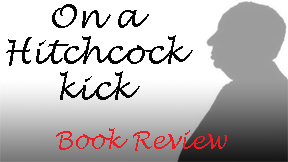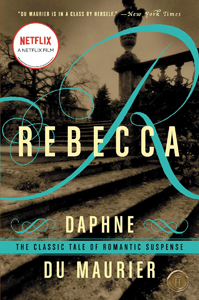When a novel, play or short story becomes an Alfred Hitchcock film, it gets promoted in prestige but demoted in the public consciousness to “source material.” This is unfair, because – although Hitch was the legit Master of Suspense – he chose fully formed source material (as opposed to a nugget that he and a writing team would reshape).
His films weren’t 100 percent faithful (no adaptations are), but the changes were often trivial. Norman Bates is fat in Robert Bloch’s “Psycho,” but Hitch didn’t pass over the skinny Anthony Perkins – perfect for the role in all ways that mattered – because of that detail.
Often the changes were mandated by censorious studios, leading to many fascinating points of debate among armchair Hitchcock scholars. One of the most famous cases is “Rebecca” (1940), adapted from Daphne du Maurier’s 1938 novel. More on that debate in a moment, but first, my experience of reading “Rebecca” …

“Rebecca” (1938)
Author: Daphne du Maurier
Genre: Romantic suspense
Setting: 1920s or ’30s, coastal Manderley estate, England
Like a perpetual first day at a new job
There’s no way around this, but the novel suffers from me having Joan Fontaine’s sympathetic portrayal of the new Mrs. de Winter in my head. The unnamed young woman, our narrator, is offered a better life by Maxim de Winter as his bride, but feels like she’s at the first day of a new job she’s unqualified for when she gets to Manderley.
du Maurier writes longish chapters (averaging 14 pages) that nudge forward Mrs. de Winter’s feelings of being in over her head, smothered by the specter of the late Rebecca, Max’s first wife. By comparison, I can just look at Fontaine’s face and this is instantly, poignantly transmitted.
The prose about Manderley – a sprawling estate by the British seaside that includes a waterlogged shack by the beach, gorgeous flowers and a substantial waitstaff — is often beautiful, evoking in me a feeling of “getting away from the city” at my family’s lake cabin when I was a kid.
Later, when Max and our narrator go into London, Max and loyal secretary Frank worry that it will be a tiring day for her. This is partly due to the era’s view of “fragile” women, but also it reminds us that highway travel wasn’t as efficient in the early 20th century and that navigating a big city (even today) is the opposite of relaxing at a country estate.
But “Rebecca” is not an urgent book; it took me a long time to read despite being less than 400 pages. Besides the spot-on portrayal of an unconfident woman gradually standing up for herself against passive-aggressive enemies like housekeeper Mrs. Danvers, the novel’s other big hook is the question of what happened to the title character.

A slow-burn mystery for the narrator (Spoilers)
(SPOILERS for the book and film follow.)
du Maurier feels no urgency on this point either, but it is a slow-burn mystery, and I imagine effective for a reader who doesn’t know Hitchcock’s film and the behind-the-scenes story of Rebecca’s fate. In the novel, Maxim reveals to his wife that he had murdered Rebecca, then faked her drowning in a sailing accident.
Hitchcock intended to be faithful to this, and no wonder: The novel then proceeds to classic Hitchcockian suspense of the authorities getting close to figuring out Max is a murderer (and our narrator, loyal to her new husband now that he’s being honest with her, would be an accomplice after the fact).
But the studio said a character played by Laurence Olivier can’t be a murderer, so therefore in the film Rebecca has committed suicide to get out of their awful marriage (both her fault and Max’s, whereas Rebecca is the singularly awful spouse in the novel). Max feels guilty about that, hence his unwillingness to talk about it with his new wife.
This leads me to an interesting side topic: In that era (and to some degree, still today), why were the gatekeepers of film so censorious, and the gatekeepers of novels were not? I have a cynical theory that there was a general view that any old idiot would go to the movies – and they had to be protected from messages – whereas smart people read novels and their brains can handle nuance.
A fiery final act (Spoilers)
du Maurier’s “Rebecca” comes alive in the final act as Max does something almost never seen in this type of plot: He calls the bluff of his accuser (Rebecca’s cousin and secret lover, Favel, a minor character in Hitch’s version) who says let’s call up the authorities right now and settle this.
The suspense is significant and fresh even for one familiar with the film, since du Maurier takes a different path. Here, “Rebecca” solidifies as a novel about the ironic balancing out of good and bad fortune in the universe. Because it turns out Rebecca secretly had terminal cancer, there’s now a motive for her suicide, and the authorities are satisfied. (And we also get a deliciously dark twist wherein she committed suicide-by-murder, baiting Max into killing her.)
So Max gets off free and clear, BUT … his beloved Manderley (now finally feeling like home to our narrator, too) is burning to the ground in the final sentences, as Mrs. Danvers has taken her revenge.
(End of spoilers.)
If there’s such a thing as a reader who hasn’t seen Hitchcock’s film, they’ll enjoy being immersed in “Rebecca’s” portrayal of how a good but meek woman can feel overwhelmed by the more powerful, confident people around her. It’s a richly written cautionary tale of a young woman’s attempt to tip-toe into self-assurance without sacrificing her innate goodness, with the bonus of a “mystery via absence of information” hanging like a shroud.
There’s no good solution for this, other than widely spacing out your viewing and reading experiences: Reading the book first will take the edge off the film; watching the film first will take the edge off the book. If you pick one, I vote for Hitchcock’s adaptation – while giving du Maurier full credit as the originator of this classic tale.
RFMC’s Alfred Hitchcock series reviews works by the Master of Suspense, plus remakes and source material. Click here to visit our Hitchcock Zone.

